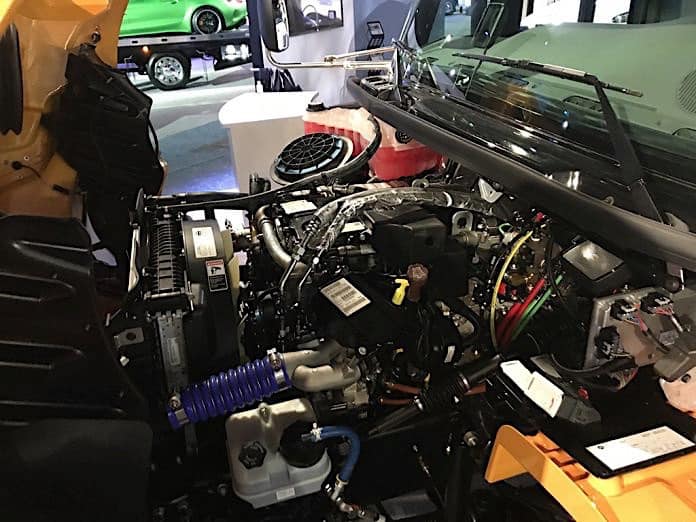Days before the National Association of State Directors of Pupil Transportation Services (NASDPTS) met in person for its Annual Conference, the Federal Motor Carrier Safety Administration (FMCSA) announced it granted a two-year exemption for the engine compartment component of the pre-trip vehicle inspections test, also as known as “under the hood” for commercial driver’s license applicants seeking the School Bus (S) and Passenger endorsements (P) as well as the Intrastate-only (K) restriction.
The FMCSA initially issued a temporary waiver, requested by the National School Transportation Association, in January and to expire at the end of March. However, the agency extended it another three months to support the recruitment of new school bus drivers because of the COVID-19 pandemic.
NSTA had requested an additional five-year extension, but instead FMCSA announced on Oct. 27 its decision to grant an exemption for a two-year period, effective from Nov. 27 of this year to Nov. 27, 2024.
According to the Federal Register, the agency received 57 public comments. Joining NSTA, school bus companies, industry associations, the Pennsylvania Department of Education, the Augusta School District in Wisconsin, and 20 other individuals supported the exemption.
NSTA stated via a social media post that providing school bus drivers relief from what it referred to as various outdated regulatory requirements has been a top priority of the association’s Advocacy Team for the past few years.
“Commenters who supported the exemption noted that school bus drivers must remain with the children and, therefore, may never leave the bus and check the engine while en route. They noted that most school districts have mechanics, not drivers, perform engine compartment inspections,” the Federal Register states. “Commenters also stated that the exemption will attract new drivers, such as young mothers and grandparents, to their industry, and alleviate school bus driver shortages and CDL testing delays. In addition, commenters said the industry is transitioning to electric buses and the ‘under-the-hood’ component is an antiquated requirement, which adds on average an additional three to four days of training time.”
The Wisconsin School Bus Association and the Augusta School District stated they have found the waivers useful to recruit and retain school bus drivers. However, when Larry Minor, the associate administrator at the FMCSA, discussed the exemption at the NASDPTS Annual Conference on Oct. 28, attendees shared reservations about how it will help school bus drivers.
Related: Pending FMCSA Notices of Proposed Rulemaking Include Driver Fitness, Speed Limiters
Related: Hutcheson Named Acting Administrator of FMCSA
For instance, school bus drivers who are issued a CDL pursuant to the requested exemption would be restricted only to the intrastate operation of school buses. Therefore, drivers wouldn’t be able to use their CDLs and work for trucking companies during the summer, to receive extra work and pay, for example.
Minor noted that it the waiver is helping school districts more than school bus drivers, as in order to drive trucks school bus drivers with the restricted CDL would have to perform additional training that would include the full under-the-hood, pre-check inspection. Instead, Minor said that the exemption helps the school districts to attract more school bus drivers to apply for open positions.
However, another NASDPTS attendee questioned if the restrictive CDL was even necessary, as the attendee said they have never experienced an applicant not becoming a school bus driver due to the under-the-hood portion. In answering an attendee, Minor clarified that the restrictive CDL is still valid after the two-year period and wouldn’t sunset after the exemption date expires in November 2024.
According to the Federal Register, eight comments opposed the exemption, one of which being NASDPTS. Others voicing opposition included the Minnesota Department of Public Safety, the Iowa Department of Transportation, Bloomington Public Schools in Indiana, AWM Associates Inc., and two individuals. The National Association of Pupil Transportation originally supported the issuance of temporary regulatory relief, but now reportedly favors the under-the-hood criteria remaining enforceable.
“NAPT noted that an added consideration for safety is the transition of school bus fleets to electric propulsion and possible new safety issues to monitor, as well as potential security threats to school buses, for which engine compartment inspections are a commonsense part of security due diligence,” the Federal Register states.
Related: Electric School Buses Continue to Create Buzz, This Time in Nation’s Capital
Related: EPA Announces Recipients of Clean School Bus Program Rebate Awards
Related: Latest National Loading, Unloading Survey Accounts for Older-Aged IEP Students
NASDPTS commented that school bus drivers must be able to check under the hood to discover issues before the school bus goes out on a route. This includes identifying worn or frayed belts or low fluid levels. “NASDPTS added that many districts rely upon school bus drivers to perform the pre-trip inspections and in rural areas, many drivers take the buses home each night and must perform the inspections themselves,” the Federal Register continued. “NASDPTS further commented that there is a shortage of maintenance personnel facing the school bus industry.”
The Minnesota Department of Public Safety questioned why the engine compartment component of the skills test would be critical for all CDL drivers except school bus drivers, and it wrote that all CDL holders should be held to the same standard. “The Minnesota DPS also stated that it is burdensome and confusing to program software for a temporary change, as well as to train law enforcement to understand and recognize the restriction,” the Federal Register notes.
Meanwhile, the Iowa Department of Transportation stated that it represents one of the few states to adopt the waiver and has found it overly burdensome and confusing to implement, which has caused delays.
















